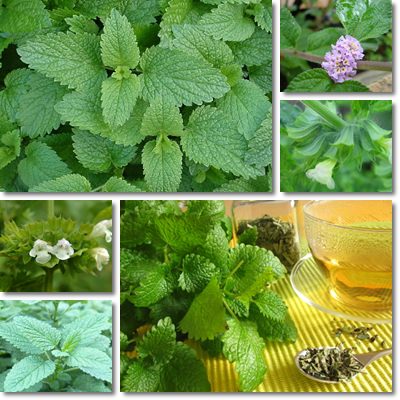The delicately scented lemon balm (Melissa officinalis) is an herb of great medicinal value. Drinking only a cup of lemon balm tea helps soothe nerves and relieves stress due to the mildly sedative properties of the herb.
Moreover, infusions of the herb are beneficial for the digestive system and are extremely useful in treating colic, stomach cramps, indigestion, alleviating nausea and relieving bloating and discomfort. Lemon balm is recommended as a natural remedy for sleep disturbances and a potent cognitive enhancer, despite its mildly sedative effects.
It is possible however that the herb’s improvement of mental function is a result of it inducing relaxation which may allow for clear thinking. Infusions are also great natural remedies for anxiety, helping improve symptoms such as insomnia, nervousness or palpitations. However, if you are suffering from thyroid problems, more exactly a lazy or underactive thyroid (hypothyroidism), lemon balm might not be the best option for you.

What does lemon balm look like?
Lemon balm (or balm mint) is a proud member of the mint family. It is a beautiful, green plant with nectar-rich small white flowers. The leaves look a lot like nettle leaves, except the latter are more elongated and pointy and they sting too. The plant is a low-maintenance garden herb that will make your entire yard smell of refreshing calm and peace. In addition to this, it is a bee favorite, meaning it will attract a lot of bees to pollinate your garden. However, it is highly invasive and will take control of your yard if not looked after.
What does lemon balm smell like?
Lemon balm has a relaxing lemon-mint scent, making it great for herbal infusions. However, when cooked, it loses flavor almost entirely so you would have to use it fresh if you want to enjoy its particular flavor. I find that lemon balm goes wonderfully as a dressing for fruit salads, alongside honey (see honey varieties). Although some people don’t find it that appetizing, chewing on a leaf or two may help get rid of bad breath.
What does lemon balm taste like?
Fresh lemon balm leaves taste as they smell: lemony. They have a delicate flavor overall, with green, herbal notes at the base.

Lemon balm benefits and uses
If you take a lemon balm leaf, crush it between your fingers and smell it, you will get an instant feeling of relaxation due to the herb being a source of volatile essential oils with mild sedative effects. This property is of great medicinal value, having been applied to treat all sorts of pains and aches. Traditional medical practices used lemon balm herbal infusions to reduce high blood pressure as a result of scares, anxiety or stress, soothe toothaches and calm rashes.
You can crush or pestle one, two lemon balm leaves and apply them on mosquito or other bug bites to relieve itching and treat the rash. Indeed, lemon balm is a great natural mosquito repellent. According to popular beliefs, drinking a cup of lemon balm tea every day can prevent baldness. Although there lacks sound scientific evidence for the anti-alopecia properties of lemon balm, a cup of herbal infusion will definitely promote relaxation of the nervous system and improve sleep.
Studies show that drinking lemon balm regularly is a great natural way to reduce mental stress, increase calmness, induce relaxation and treat disturbed sleep. Moreover, a study conducted at Northumbria University in England, published in the September 2004 issue of Prevention Magazine, concluded that lemon balm improves cognitive performance naturally. Students who drank balm tea showed a significant improvement in cognitive performance and recorded much higher scores on tests than students who were given a placebo. Moreover, those taking lemon balm showed more calm and felt less stressed during the tests given.
In addition to this, it appears that daily doses of lemon balm improve superoxide dismutase levels and decrease DNA damage. Superoxide dismutase represent a group of enzymes with powerful antioxidant function which prevent cell damage such as cell mutations and subsequent related diseases. According to researchers, lemon balm greatly increases SOD levels. Good to know: good copper, manganese and zinc daily intakes are necessary for the good functioning of the antioxidant processes carried out by these enzymes.
Due to its mildly sedative properties, lemon balm infusions help soothe gastrointestinal disorders such as stomach cramps, reduce gas and bloating, alleviate nausea and vomiting. The variety of essential oils in lemon balm and lemon balm essential oil relax urinary tract, bladder, uterus and stomach muscles and thus help relieve pain caused by spasms. The same essential oils are responsible for the relaxing effects of the herb which help treat restlessness, irritability, stress, tension, minor muscle spasms and headaches.
Lemon balm creams are used for the treatment of oral herpes caused by the Herpes Simplex virus. According to several studies, lemon balm not only shortens healing time, but also reduces the risk of herpes recurrence do to having strong antibacterial properties.
A cup of hot, fragrant lemon balm tea is an excellent end to a stressful day because it will help you relax and sleep better. You can drink the tea regularly for better results. Nevertheless, if you are on hypothyroidism medication or if you are taking anti-anxiety medication or prescription sedatives, you should avoid lemon balm because it might interfere with your medication. In any case, it is best to consult your doctor in such cases.
